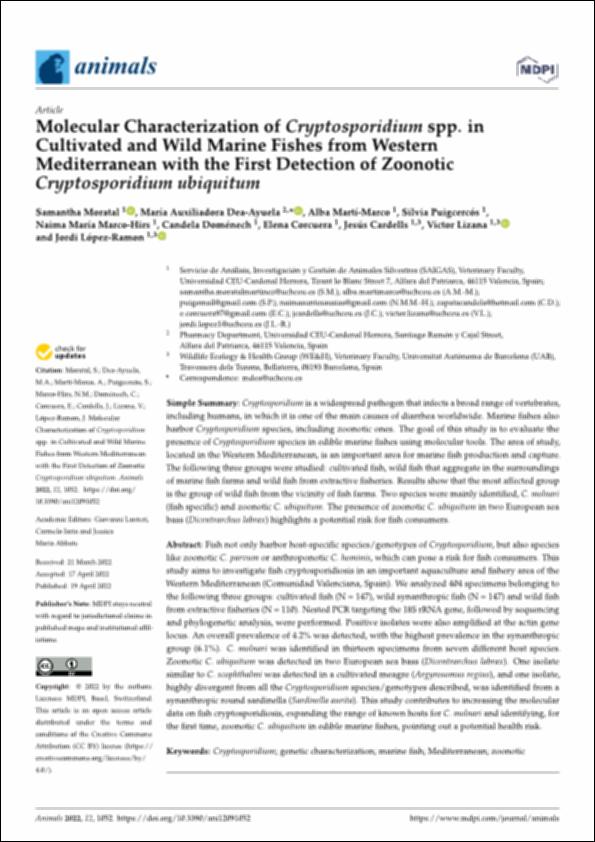Por favor, use este identificador para citar o enlazar este ítem:
http://hdl.handle.net/10637/14263Molecular characterization of "Cryptosporidium" spp. in cultivated and wild marine fishes from Western Mediterranean with the first detection of zoonotic "Cryptosporidium ubiquitum"
| Título : | Molecular characterization of "Cryptosporidium" spp. in cultivated and wild marine fishes from Western Mediterranean with the first detection of zoonotic "Cryptosporidium ubiquitum" |
| Autor : | Moratal, Samantha Dea Ayuela, María Auxiliadora Martí Marco, Alba Puigcercós Gomila, Silvia Marco Hirs, Naima M. Doménech, Candela Corcuera, Elena Cardells Peris, Jesús Lizana Martín, Víctor Manuel López Ramon, Jordi |
| Materias: | Cryptosporidiosis.; Criptosporidiosis.; Peces de agua salada - Genética.; Marine fishes - Genetics.; Marine fishes - Communicable diseases.; Zoonosis.; Zoonoses.; Peces de agua salada - Enfermedades infecciosas. |
| Editorial : | MDPI |
| Citación : | Moratal, S., Dea-Ayuela, M. A., Martí-Marco, A., Puigcercós, S., Marco-Hirs, N. M., Doménech, C., Corcuera, E., Cardells, J., Lizana, V. & López-Ramon, J. (2022). Molecular characterization of "Cryptosporidium" spp. in cultivated and wild marine fishes from Western Mediterranean with the first detection of zoonotic "Cryptosporidium ubiquitum". Animals, vol. 12, i. 9 (19 apr.), art. 1052. DOI: https://doi.org/10.3390/ani12091052 |
| Resumen : | Fish not only harbor host-specific species/genotypes of Cryptosporidium, but also species like zoonotic C. parvum or anthroponotic C. hominis, which can pose a risk for fish consumers. This study aims to investigate fish cryptosporidiosis in an important aquaculture and fishery area of the Western Mediterranean (Comunidad Valenciana, Spain). We analyzed 404 specimens belonging to the following three groups: cultivated fish (N = 147), wild synanthropic fish (N = 147) and wild fish from extractive fisheries (N = 110). Nested PCR targeting the 18S rRNA gene, followed by sequencing and phylogenetic analysis, were performed. Positive isolates were also amplified at the actin gene locus. An overall prevalence of 4.2% was detected, with the highest prevalence in the synanthropic group (6.1%). C. molnari was identified in thirteen specimens from seven different host species. Zoonotic C. ubiquitum was detected in two European sea bass (Dicentrarchus labrax). One isolate similar to C. scophthalmi was detected in a cultivated meagre (Argyrosomus regius), and one isolate, highly divergent from all the Cryptosporidium species/genotypes described, was identified from a synanthropic round sardinella (Sardinella aurita). This study contributes to increasing the molecular data on fish cryptosporidiosis, expanding the range of known hosts for C. molnari and identifying, for the first time, zoonotic C. ubiquitum in edible marine fishes, pointing out a potential health risk. |
| Descripción : | Este artículo se encuentra disponible en la siguiente URL: https://www.mdpi.com/2076-2615/12/9/1052 Este artículo de investigación pertenece al número especial "Diseases in Laboratory and Wild Aquatic Organisms". |
| URI : | http://hdl.handle.net/10637/14263 |
| Derechos: | http://creativecommons.org/licenses/by/4.0/deed.es |
| ISSN : | 2076-2615 (Electrónico) |
| Idioma: | es |
| Fecha de publicación : | 19-abr-2022 |
| Centro : | Universidad Cardenal Herrera-CEU |
| Aparece en las colecciones: | Dpto. Producción y Sanidad Animal, Salud Pública Veterinaria y Ciencia y Tecnología de los Alimentos |
Los ítems de DSpace están protegidos por copyright, con todos los derechos reservados, a menos que se indique lo contrario.


